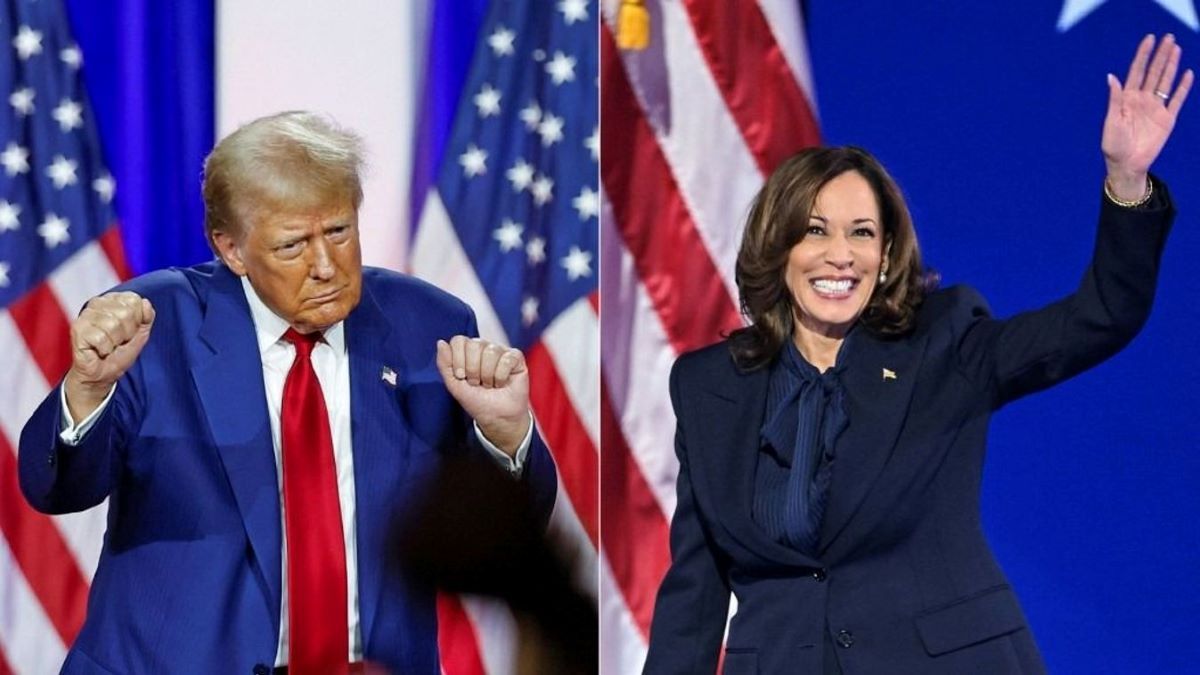@perceptron Mi alapján van meghatározva egy egy államban az elektorok száma? Népesség szám alapján?Ez a tippem holnapra.
De sztem NH, MN vmint Texas a billegőkön kívül nagyon szoros lesz.

-
Ha nem vagy kibékülve az alapértelmezettnek beállított sötét sablonnal, akkor a korábbi ígéretnek megfelelően bármikor átválthatsz a korábbi világos színekkel dolgozó kinézetre.
Ehhez görgess a lap aljára és a baloldalon keresd a HTKA Dark feliratú gombot. Kattints rá, majd a megnyíló ablakban válaszd a HTKA Light lehetőséget. Választásod a böngésződ elmenti cookie-ba, így amikor legközelebb érkezel ezt a műveletsort nem kell megismételned. -
Az elmúlt időszak tapasztalatai alapján házirendet kapott a topic.
Ezen témában - a fórumon rendhagyó módon - az oldal üzemeltetője saját álláspontja, meggyőződése alapján nem enged bizonyos véleményeket, mivel meglátása szerint az káros a járványhelyzet enyhítését célzó törekvésekre.
Kérünk, hogy a vírus veszélyességét kétségbe vonó, oltásellenes véleményed más platformon fejtsd ki. Nálunk ennek nincs helye. Az ilyen hozzászólásokért 1 alkalommal figyelmeztetés jár, majd folytatása esetén a témáról letiltás. Arra is kérünk, hogy a fórum más témáiba ne vigyétek át, mert azért viszont már a fórum egészéről letiltás járhat hosszabb-rövidebb időre.
-
Az elmúlt időszak tapasztalatai alapján frissített házirendet kapott a topic.
--- VÁLTOZÁS A MODERÁLÁSBAN ---
A források, hírek preferáltak. Azoknak, akik veszik a fáradságot és összegyűjtik ezeket a főként harcokkal, a háború jelenlegi állásával és haditechnika szempontjából érdekes híreket, (mindegy milyen oldali) forrásokkal alátámasztják és bonuszként legalább a címet egy google fordítóba berakják, azoknak ismételten köszönjük az áldozatos munkáját és további kitartást kívánunk nekik!
Ami nem a topik témájába vág vagy akár csak erősebb hangnemben is kerül megfogalmazásra, az valamilyen formában szankcionálva lesz
Minden olyan hozzászólásért ami nem hír, vagy szorosan a konfliktushoz kapcsolódó vélemény / elemzés azért instant 3 nap topic letiltás jár. Aki pedig ezzel trükközne és folytatná másik topicban annak 2 hónap fórum ban a jussa.
You are using an out of date browser. It may not display this or other websites correctly.
You should upgrade or use an alternative browser.
You should upgrade or use an alternative browser.
Olyan sok ellentetes info jon higy egyszeruen nem lehet eldonteni ki all nyeresre de mar csak 2 kell aludni es kiderul.Ez a tippem holnapra.
De sztem NH, MN vmint Texas a billegőkön kívül nagyon szoros lesz.

Népesség. Ezt automatikusan korrigálják 4 évente.@perceptron Mi alapján van meghatározva egy egy államban az elektorok száma? Népesség szám alapján?
...........................................................................................................kit hoznak ki nyertesnek.............................Olyan sok ellentetes info jon higy egyszeruen nem lehet eldonteni ki all nyeresre de mar csak 2 kell aludni es kiderul.
Valo igaz majd kiderül, de ha nem teump nyer erdekel majd a kormanyunk hogy mit fog mondani ha mar ennyire hangosan kialltak mellette............................................................................................................kit hoznak ki nyertesnek.............................
Végülis igen, bár közvetve: minden állam elektorainak a száma egyenlő az adott állam összes kongresszusi képviseletével, azaz 2 szenator plusz ahany képviselői körzete van (ami ugye a House képviselők száma). Utóbbiakat a népesség alapján kalkulálják, szóval áttételesen, de erinti az elektorok számát is.@perceptron Mi alapján van meghatározva egy egy államban az elektorok száma? Népesség szám alapján?
Népesség. Ezt automatikusan korrigálják 4 évente.
Dehogy, akkor állandóan menne a cirkusz.

Census mindig 10 évente van, legutóbb 2020-ban volt, ez az érvényes adat a 2024 és 2028 valasztasokhoz, a 2030-as census majd updateli a 2032-36-40-eshez és igy tovább.
Ha tippelnem kéne akkor lapítanak majd, mint szar a gazba....Valo igaz majd kiderül, de ha nem teump nyer erdekel majd a kormanyunk hogy mit fog mondani ha mar ennyire hangosan kialltak mellette.
Én attól félek, hogy nagy pofára esés lesz a vége, de ne legyen igazam! Orbán mindent egy lapra tett fel....áll minden, beszerzések! Pesszimista vagyok nagyon!Valo igaz majd kiderül, de ha nem teump nyer erdekel majd a kormanyunk hogy mit fog mondani ha mar ennyire hangosan kialltak mellette.
Végülis igen, bár közvetve: minden állam elektorainak a száma egyenlő az adott állam összes kongresszusi képviseletével, azaz 2 szenator plusz ahany képviselői körzete van (ami ugye a House képviselők száma). Utóbbiakat a népesség alapján kalkulálják, szóval áttételesen, de erinti az elektorok számát is.
Dehogy, akkor állandóan menne a cirkusz.
Census mindig 10 évente van, legutóbb 2020-ban volt, ez az érvényes adat a 2024 és 2028 valasztasokhoz, a 2030-as census majd updateli a 2032-36-40-eshez és igy tovább.
Köszi

Orbán semmit sem kockáztat, csak nyerhet. A Demokraták úgy sem kegyelmeznének neki, eddig se tették, mindegy mit mond.Én attól félek, hogy nagy pofára esés lesz a vége, de ne legyen igazam! Orbán mindent egy lapra tett fel....áll minden, beszerzések! Pesszimista vagyok nagyon!
Ha még Trump nyer,akkor ez a csütörtöki csúcstalálkozó érdekes lesz.

Orbán Viktor: Budapesten lesz a nyugati világ csúcstalálkozója
Budapesten lesz jövő héten a nyugati világ csúcstalálkozója, 45-47 állam- és kormányfő érkezik a magyar fővárosba - közölte Orbán Viktor magyar miniszterelnök vasárnap a Kossuth rádió Vasárnapi újság című műsorában.
nyugati világ csúcstalálkozója, 45-47 állam- és kormányfő érkezik a magyar fővárosba.
ez lesz Magyarország történetének legnagyobb diplomáciai eseménye, melyre nemcsak az uniós vezetők, például a németek, franciák, hollandok érkeznek, hanem itt lesznek az unión kívüliek, azaz az angolok, a törökök, a kaukázusiak meg az észak- és nyugat-balkániak is.
Aki ezt a csúcsot időzítette elég profi volt.
Ha itthon történik ez, az más ugye?
Magyarországon jogosak a kritikák, USA-ban meg még a rep politikusok se mondták hogy csalás lett volna. Csak Trump és köre. Viszont érdekes, hogy most ennyire előre csalást kiáltanak. Holott lehet hogy épp Trumpék azok akikről el lehet képzelni, hogy csalásra vetemednének. Megkülönböztetve Trumpékat az old school repektől.
Mindig mindenki csal csak te és akiket te képviselsz azok a fáklyás menet.Ha az van amit te akarsz az a szin tiszta igazság...ha nem akkor választási csalás...akár MO akár USA akár bárhol is a világon.................semmire sincs bizonyítékod csak vádaskodsz....Még veszíteni sem tudtok.....soha nem is tanítottak meg titeket.Magyarországon jogosak a kritikák, USA-ban meg még a rep politikusok se mondták hogy csalás lett volna. Csak Trump és köre. Viszont érdekes, hogy most ennyire előre csalást kiáltanak. Holott lehet hogy épp Trumpék azok akikről el lehet képzelni, hogy csalásra vetemednének. Megkülönböztetve Trumpékat az old school repektől.





Magyarországon jogosak a kritikák, USA-ban meg még a rep politikusok se mondták hogy csalás lett volna. Csak Trump és köre. Viszont érdekes, hogy most ennyire előre csalást kiáltanak. Holott lehet hogy épp Trumpék azok akikről el lehet képzelni, hogy csalásra vetemednének. Megkülönböztetve Trumpékat az old school repektől.
Kérdés hogyan tudnának csalni. Azt tudjuk Bidétől, hogy a demokraták a "history's most extensive voter fraud organization"-t építették ki még a 2020-as előtt...

A vicc az hogy népesség és nem állampolgár. Tehát az illegálisak is beleszámolva.Népesség. Ezt automatikusan korrigálják 4 évente.
Dehogynem mondtak, ne terjesszunk mar hulyesegeket.Magyarországon jogosak a kritikák, USA-ban meg még a rep politikusok se mondták hogy csalás lett volna. Csak Trump és köre.
Sot, 2016-ban Billary es az osszes befolyasos demokrata "illegitimi president" neven titulalta egy even at Trumpot, nem fogadtak el soha, hogy jogosan nyert, kitalaltak a Russia-gate, az utolag teljesen kamunak bizonyult Steele-dossziet es igy tovabb.
2000-ben a Supreme Courtig vittek Gore-ek, olyan
Jah, hat ez aztan qrva logikus - ha valakirol el lehet kepzelni a csalast, akkor az a demokrata kezben levo szovetsegi burokracia, onmaga megmentesere, akinek megvan a hozzaferese es vegtelen eroforrasai is, nem gondolod?Viszont érdekes, hogy most ennyire előre csalást kiáltanak. Holott lehet hogy épp Trumpék azok akikről el lehet képzelni, hogy csalásra vetemednének. Megkülönböztetve Trumpékat az old school repektől.

Top Battlegrounds – RCP Average
Wisconsin, Arizona, Georgia, Michigan, Pennsylvania, North Carolina, Nevada
Wisconsin, Arizona, Georgia, Michigan, Pennsylvania, North Carolina, Nevada
| RCP Average | Date | Trump (R) | Harris (D) | Spread |
|---|---|---|---|---|
| Top Battlegrounds | 11/4 | 48.6 | 47.7 | Trump+0.9 |
| Arizona | November 4th | 48.9 | 46.2 | Trump+2.7 |
| Nevada | November 4th | 48.5 | 47.5 | Trump+1.0 |
| Wisconsin | November 4th | 48.2 | 48.6 | Harris+0.4 |
| Michigan | November 4th | 47.8 | 48.4 | Harris+0.6 |
| Pennsylvania | November 4th | 48.3 | 48.0 | Trump+0.3 |
| North Carolina | November 4th | 48.8 | 47.3 | Trump+1.5 |
| Georgia | November 4th | 49.4 | 47.7 | Trump+1.7 |
Szerintem ez sokaknak segiteni fog megerteni az EC ertelmet...
By Erin Blakemore
October 16, 2020
Born of compromise and enshrined in the U.S. Constitution, the Electoral College isn’t a place. It’s a temporary voting body that elects the president of the United States. When voters select their presidential and vice-presidential candidates on Election Day, they’re actually choosing the members of this body who will cast votes on their behalf in the days and weeks after the election.
For more than 200 years, this confusing and contentious institution has split opinions and overseen some truly rocky presidential elections. It has elected five presidents who didn’t win a majority of American votes and resulted in one tie. And though most electors vote for their pledged candidates, some have historically gone back on their promises.
Every four years, debate revives over the efficacy, equality, and even necessity of this electoral system. Here’s what you need to know about how it came about, how it works, and the proposals for Electoral College reform.
Giving states electoral power also raised the question of how less populous states would be represented. This was a sticking point among Southern slaveholding states, which lacked the population of their northern neighbors. Delegates from those states insisted that their enslaved residents, who were not considered citizens and would not be allowed to vote, be counted for the purpose of allocating electoral votes.
Finally, the framers hit on a solution that balanced all of these factors. Article II of the Constitution holds that each state should appoint electors equal to the number of its U.S. senators and representatives. While the size of the House of Representatives would be based on population—as determined by the U.S. Census—each state received two senators to give a small bump in power to less populous states.
The question of how to count enslaved people resulted in the notorious Three-Fifths Compromise, which determined that three out of every five slaves would be counted as persons for congressional representation, taxation, and the Electoral College.
One point that the Founding Fathers didn’t consider during their deliberations was how to distinguish between ballots for the president and vice president. This flaw would become obvious in the nation’s fourth election in 1800, which resulted in a tie between presidential candidate Thomas Jefferson and his running mate Aaron Burr. The contest was thrown to the U.S. House of Representatives, which ultimately selected Jefferson after deadlocking 35 times. In 1804, the 12th Amendment was passed to create separate votes for presidents and vice presidents in the Electoral College.
Then there was the matter of who was qualified to be an elector. The Constitution originally provided only that electors couldn’t be members of Congress or federal employees and left it up to the states to decide who they would choose and how.
In 1868, however, the 14th Amendment added a requirement that electors can’t have participated in a rebellion against the United States or have aided its enemies. More notably, it also negated the Three-Fifths Compromise by conferring citizenship on formerly enslaved people at the end of the Civil War, ensuring that each individual would be counted.
In modern elections, there are 538 electors. To win the election, a candidate must win a majority—270 electoral votes.
State rules vary on how to allocate electoral votes. In the winner-take-all system, all of the state’s electoral votes are allocated to the slate of electors chosen by the political party of the candidate who won the state’s popular vote.
Maine and Nebraska assign electoral votes by congressional district, a system that has resulted in one split election in each state.
Then, in 2019, Maine became the first state to adopt a ranked-choice system in which voters rank candidates in order of preference. If no candidate receives a majority, the votes are then tabulated in rounds, and the lowest-ranked candidates are eliminated until only two are left. In the final round, the candidate with 50 percent or more of the vote wins.
After Election Day, which takes place on the first Tuesday after the first Monday in November, states use the remainder of November and December to gather, certify, and send their electors’ formal votes for president and vice president to the National Archives and Records Administration, which administers the Electoral College.
The votes are counted in a joint session of Congress on January 6. The sitting vice president—who is also president of the Senate—presides over the session, opening the votes, reading them aloud, and passing them to two “tellers” from each chamber who count them. If one candidate receives 270 or more electoral votes, the vice president announces the results—including, sometimes, their own win or loss.
Members of Congress can object to individual electors’ returns or states’ overall returns. If a written objection is signed by at least one senator and one member of the House of Representatives, it bumps the session to a recess. The two houses then debate the objections and vote on whether to accept or reject them. Both houses must agree to reject the returns to exclude them from the final tally.
The Electoral College would allow a candidate to win a majority of the popular vote and lose the election four more times in history—in 1876, 1888, 2000, and 2016.
Here’s why the Electoral College exists—and how it could be reformed
Controversial since its creation, this U.S. institution has elected five presidents who didn’t win a majority of votes and has even resulted in one tie.By Erin Blakemore
October 16, 2020
Born of compromise and enshrined in the U.S. Constitution, the Electoral College isn’t a place. It’s a temporary voting body that elects the president of the United States. When voters select their presidential and vice-presidential candidates on Election Day, they’re actually choosing the members of this body who will cast votes on their behalf in the days and weeks after the election.
For more than 200 years, this confusing and contentious institution has split opinions and overseen some truly rocky presidential elections. It has elected five presidents who didn’t win a majority of American votes and resulted in one tie. And though most electors vote for their pledged candidates, some have historically gone back on their promises.
Every four years, debate revives over the efficacy, equality, and even necessity of this electoral system. Here’s what you need to know about how it came about, how it works, and the proposals for Electoral College reform.
The Electoral College and the Constitution
The Electoral College is the result of a series of compromises struck during the grueling Constitutional Convention of 1787. Delegates quibbled over, and discarded, a variety of ways to elect a president. Some believed citizens should vote directly while others argued that Congress should decide. Still others insisted this would give the national legislative body too much power and that the decision should lie with the states. But that was contentious, too, because delegates couldn’t agree on what role, if any, state legislators and governors should play in the process.Giving states electoral power also raised the question of how less populous states would be represented. This was a sticking point among Southern slaveholding states, which lacked the population of their northern neighbors. Delegates from those states insisted that their enslaved residents, who were not considered citizens and would not be allowed to vote, be counted for the purpose of allocating electoral votes.
Finally, the framers hit on a solution that balanced all of these factors. Article II of the Constitution holds that each state should appoint electors equal to the number of its U.S. senators and representatives. While the size of the House of Representatives would be based on population—as determined by the U.S. Census—each state received two senators to give a small bump in power to less populous states.
The question of how to count enslaved people resulted in the notorious Three-Fifths Compromise, which determined that three out of every five slaves would be counted as persons for congressional representation, taxation, and the Electoral College.
One point that the Founding Fathers didn’t consider during their deliberations was how to distinguish between ballots for the president and vice president. This flaw would become obvious in the nation’s fourth election in 1800, which resulted in a tie between presidential candidate Thomas Jefferson and his running mate Aaron Burr. The contest was thrown to the U.S. House of Representatives, which ultimately selected Jefferson after deadlocking 35 times. In 1804, the 12th Amendment was passed to create separate votes for presidents and vice presidents in the Electoral College.
Then there was the matter of who was qualified to be an elector. The Constitution originally provided only that electors couldn’t be members of Congress or federal employees and left it up to the states to decide who they would choose and how.
In 1868, however, the 14th Amendment added a requirement that electors can’t have participated in a rebellion against the United States or have aided its enemies. More notably, it also negated the Three-Fifths Compromise by conferring citizenship on formerly enslaved people at the end of the Civil War, ensuring that each individual would be counted.
How states allocate electoral votes
States’ approaches to their electors varied from the start. At first, Connecticut, South Carolina, and Georgia’s state legislatures appointed electors directly, while other states let citizens decide. But as political factions grew, states’ procedures changed and slowly shifted this role to political parties. Now, political parties select a slate of people in each state who will stand as electors for the party’s candidate.In modern elections, there are 538 electors. To win the election, a candidate must win a majority—270 electoral votes.
State rules vary on how to allocate electoral votes. In the winner-take-all system, all of the state’s electoral votes are allocated to the slate of electors chosen by the political party of the candidate who won the state’s popular vote.
Maine and Nebraska assign electoral votes by congressional district, a system that has resulted in one split election in each state.
Then, in 2019, Maine became the first state to adopt a ranked-choice system in which voters rank candidates in order of preference. If no candidate receives a majority, the votes are then tabulated in rounds, and the lowest-ranked candidates are eliminated until only two are left. In the final round, the candidate with 50 percent or more of the vote wins.
Counting the votes
Though a candidate usually declares victory or concedes on Election Night, the returns reported by the media immediately after the election are only preliminary. The official count comes later, when the electors cast their official votes.After Election Day, which takes place on the first Tuesday after the first Monday in November, states use the remainder of November and December to gather, certify, and send their electors’ formal votes for president and vice president to the National Archives and Records Administration, which administers the Electoral College.
The votes are counted in a joint session of Congress on January 6. The sitting vice president—who is also president of the Senate—presides over the session, opening the votes, reading them aloud, and passing them to two “tellers” from each chamber who count them. If one candidate receives 270 or more electoral votes, the vice president announces the results—including, sometimes, their own win or loss.
Members of Congress can object to individual electors’ returns or states’ overall returns. If a written objection is signed by at least one senator and one member of the House of Representatives, it bumps the session to a recess. The two houses then debate the objections and vote on whether to accept or reject them. Both houses must agree to reject the returns to exclude them from the final tally.
The Electoral College and the popular vote
Although there hasn’t been a tie in the Electoral College since Jefferson and his running mate Burr split the votes in 1800, the U.S. House of Representatives was called in to decide the vote for a second and last time in 1824. At the time, the Democratic-Republican party had fragmented, and no candidate won the majority of the electoral votes. Ultimately, the House of Representatives chose John Quincy Adams instead of Andrew Jackson, who had won the popular vote.The Electoral College would allow a candidate to win a majority of the popular vote and lose the election four more times in history—in 1876, 1888, 2000, and 2016.
Hajrá President Garrison!


 mandiner.hu
mandiner.hu

 mandiner.hu
mandiner.hu


Trump vagy Harris: hogy állnak a választást eldöntő csatatérállamok Amerikában? - Mandiner
Mik azok a csatatérállamok, és mi a tétjük Donald Trump és Kamala Harris szempontjából a 2024-es amerikai elnökválasztáson?

Itt az idő: Donald Trump az amerikai politika egyik legnagyobb visszatérését mutathatja be - Mandiner
2024-ben az amerikaiak helyrehozhatják 2020 tévedéseit – a nyugati világnak szüksége van erre. Gladden Pappin írása.

